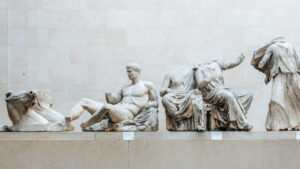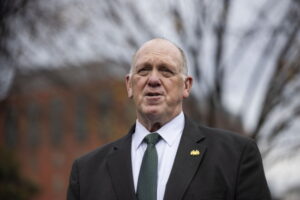The new Labour government in Britain is leaving an open window for the return of the Parthenon Sculptures to Athens on a long-term loan scheme, as Kir Starmers seeks to strengthen his country’s ties with the European Union.
On Monday, Culture Secretary Chris Bryant addressed the issue in Parliament in response to a question, saying it was up to the British Museum’s management to take the matter further, while he referred to the “constructive cooperation” that the museum’s chairman, George Osborne, had with the Greek government. In addition, he praised the museum’s efforts to resolve international disputes – including the one over the Parthenon Sculptures.
“Decisions concerning the care and management of the museum’s collections, including the loan of objects from their collection, are a matter for the trustees of the British Museum under the British Museum Act 1963. The British Museum is functionally independent of government. We are aware that the chairman of the trustees, George Osborne, has had discussions with Greek ministers on the matter, seeking constructive cooperation. We value the work that the British Museum does internationally and welcome the success of its partnerships. With regard to the legal title to the Parthenon Sculptures, the removal of the Sculptures was legal and documented. They were transferred to the British Museum in 1816 and have been the legal property of the British Museum, not the British government, ever since.”
This particular dispute has been going on for centuries, with Rishi Sunak and Kyriakos Mitsotakis clashing fiercely over the issue last year.
Former Tory finance minister George Osborne is trying to negotiate a deal from his position as chairman of the British Museum’s board of commissioners. This could include sending the Marbles to Greece for a decade.
Ending this particular saga could boost Starmer’s efforts to “reset” relations with Europe, which he has made a priority for his premiership.
The fifth-century BC Parthenon Sculptures were brought from Athens to Britain between 1801 and 1812 by Elgin when it was still part of the Ottoman Empire. Elgin, who was an ambassador to Britain, planned to create a private museum before moving them to the British Museum.
Greece insists the items were illegally acquired by him, but the UK is adamant they were legally acquired by Lord with the permission of the Ottoman authorities.
It should be noted that a 1963 law prevents the British Museum from permanently disposing of key items from its collection, although it would not prevent a loan agreement.
Last November a diplomatic row “erupted” between the UK and Greece centred on the sculptures.
At the time, Sunak cancelled a meeting with Greek Prime Minister Kyriakos Mitsotakis in London after the latter said Britain’s retention of the Sculptures would be like “cutting the Mona Lisa in half”.
In March 2023, the former British Prime Minister underlined his position that the relics in question should remain in Britain. “The UK has looked after the Elgin Marbles for generations,” he had said, adding that “our galleries and museums are funded by taxpayers because they are a huge asset to this country. We share their treasures with the world and people come to the UK to see them.”
</html
Ask me anything
Explore related questions





